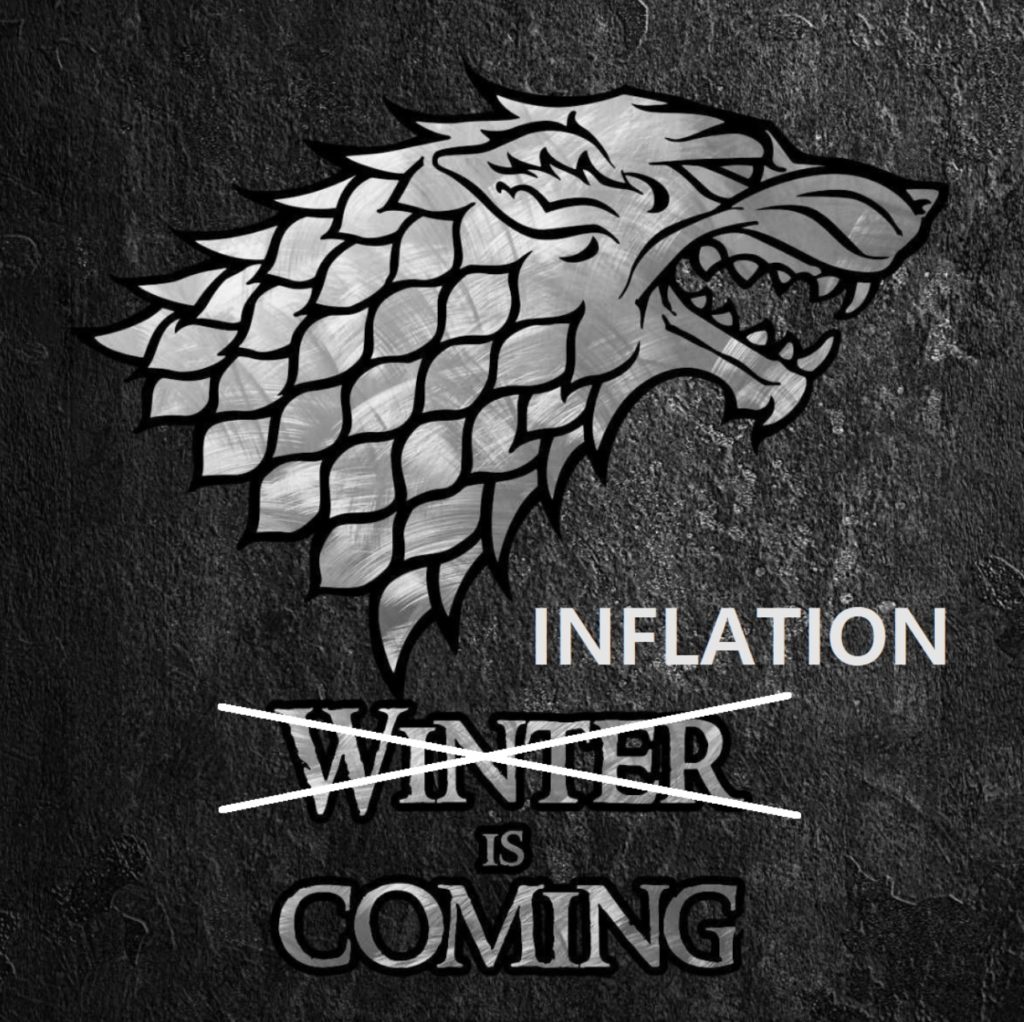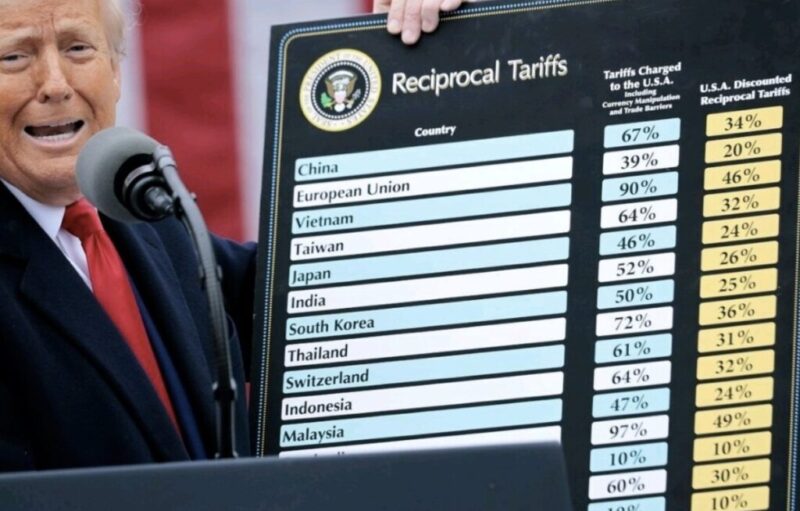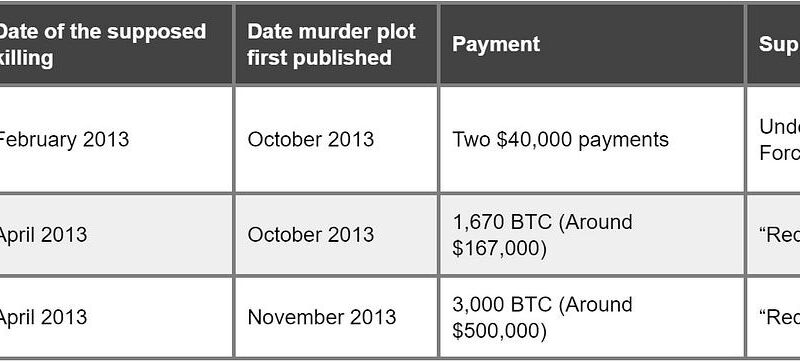Abstract: We evaluate the impact of Coronavirus on the economy and financial markets. The response to the virus will mark a significant economic regime change, from monetary policy to central bank funded fiscal expansion. Eventually, there will be one clear winner under this new regime: inflation. Economic circumstances could look like the 1970s, with volatile inflationary expectations. This regime change and inflation will be something financial markets find difficult to tolerate. In this environment, Bitcoin could be given its biggest opportunity, in its short lifetime.

(Image modified from HBO’s Game of Thrones: “Winter is Coming” – House Stark)
The Coronavirus Financial Market Crash
The 2020 coronavirus stock market crash is now establishing itself as one of the great stock market crashes, alongside:
- Global Financial Crisis (2008)
- Dotcom bubble (2000)
- Asian crisis (1997)
- Black Wednesday (1992)
- Japan asset bubble (1991)
- Black Monday (1987)
- Oil crisis (1973)
- Wall Street Crash (1929)
On 17th March 2020 the volatility index (VIX) reached a high of 84.83, just shy of the 89.53 peak reached in the 2008 global financial crisis. At the time of writing, peak to trough, the S&P 500 has fallen over 30% in 2020, and the Dow Jones Industrial average saw its largest daily decline since black Monday in 1987. There is now little doubt that in financial terms, the Coronavirus crisis of 2020 is one for the history books. Asset managers, who went into the crisis more leveraged than ever, are in a desperate race to obtain US Dollars, sending almost all asset prices spiralling downwards, from equities to commodities and non-government bonds to cryptocurrencies.
Central banks and governments have been fast to respond. In the US the Federal Reserve lowered interest rates to near zero (0% to 0.25%), announced the purchase of at least $500bn of treasuries and $200bn of mortgage backed securities, and also reduced the commercial bank reserve requirement to absolute zero. And there is probably more to come. However, it is now becoming clearer and clearer, this is the last major throw of the dice from central bankers. Monetary policy will not be enough.
Central Banks Have Run Out Of Road
It is no longer unfashionable to say that central banks have reached the limit of what they can do. Infact, it’s now the consensus opinion, even among central bankers themselves. One can pick your favourite argument (or combination of arguments):
- Interest rates are already at the lower bound. The lower bound is 0%, since if we go much below this rate, the public will simply hoard physical cash.
- Purchasing more government debt only helps commercial banks in a liquidity crisis, the transmission mechanism to the real economy is now broken.
- We have reached the “reversal interest rate”, where the impact on commercial banks of further interest rate declines is a net negative, due to lower net interest margins. Therefore lower interest rates cause economic contractions.
- We have reached the behavioral limits of central bank expansionary monetary policy, any further extreme measures will send a negative signal to the consumer and have a net negative impact on the real economy.
The above arguments are becoming more and more compelling. The message from the central bankers themselves is now crystal clear:
it is time for fiscal stimulus
(Source: FT)
Were We Even On The Right Road?
Perhaps a more significant issue to address, is whether central banks were going down the correct road in the first place. The response to the 2000 Dotcom bubble was to lower the interest rate from 6.5% to 1%, then in the 2008 financial crisis the response was to lower the interest rate from 5.25% to 0.25%.
Federal Reserve Interest Rate
(Source: Bloomberg)
Federal Reserve policy is based on models which assumes that monetary policy does not impact the structure of the economy, instead it just eases the flow in which money flows through the system. However, in our view, policy has become so extreme that this is no longer the case. Federal Reserve policy has become the primary driver of change in the structure of the economy. The response to conditions getting bad ensures that, down the road, they will go bad again and, crucially, worse. These interest rate policies may have propagated a sequence of financial crises, each of which was “solved” by a lower interest rate, which in turn sowed the seeds of the next crisis.
Whatever one’s view of monetary policy, now there can be little doubt, the current system cannot take another crisis. It is time for a change.
Economic Regime Change
Governments around the world are set to run large fiscal deficits, no longer just as a consequence of higher spending requirements, but as part of a deliberate strategy to stimulate the economy.
These newer larger deficits will be funded directly by central bank purchases of government securities, and could be given a variety of names:
- The People’s QE,
- The People’s Bailout,
- Modern Monetary Theory,
- Universal Basic Income,
- Helicopter Money,
- Fiscal transfers,
- A Green New Deal,
- Handout Schemes (Hong Kong & the US)
- Coronavirus Salary Cover
The request is coming from the central bankers and governments will be more than happy to respond. Although this fiscal policy will be in part driven by a lack of monetary firepower, governments are unlikely to want to resist anyway. Governments will also be under considerable pressure from the population. Initially the demands could focus on mitigating the impact of Coronavirus. Providing people funds so they can purchase necessities if they lose their income due to the economic shutdown and compensating businesses for lost income due to measures in place to prevent the spread of the virus. However, it is not only the virus that will drive spending. Political populism, driven by growing income and wealth inequality will also pressurise the government to spend more. The climate crisis could also be an issue that requires massive amounts of government spending to mitigate.
Given the impact of the economic shutdown related to Coronavirus, there can be little doubt that this is the direction we are heading in and we are moving there fast. And lets not delude ourselves, this is a major policy shift, an economic regime change, which will have consequences.
The Inflation Shock
With monetary policy, central banks are often fearful of taking action which could be seen as benefiting particular individuals and therefore the outcome is somewhat uncertain. However, there will be one clear winner from the new era of fiscal expansion, inflation. Not only will inflation come, but it will be a shock. Inflation like this has been eradicated from our collective memories. Inflation has been low and stable for over 30 years and politicians and the public are unaware of the risks. We cannot predict how and when the inflation will emerge, however, at some point there will be a sudden shock. Not only an economic shock, but a cultural shock.
In our view, the best analogy for where we are headed towards is the 1970s, where inflation was volatile and reached a high of 15%.
US Consumer Price Inflation (YoY Change)
(Source: Bloomberg)
Markets are intolerant of change. It is not just our politics, economy and culture that will be shocked by the inflation, but financial markets too. Financial markets have become very used to the current regime, protected by a “central bank put”. Transitioning from this to a new regime, driven by fiscal expansion and volatile inflationary expectations will be interesting. Volatile times are ahead.
Bitcoin’s Biggest Test
In such an economic environment, with high inflationary expectations, gold looks set to shine. But what about Bitcoin? Bitcoin has crashed by almost 53% (peak to trough) in the 2020 Coronavirus crash, as investors raced to the US Dollar. In many ways this was inevitable. Where the Bitcoin price may shine is in the volatile inflationary aftermath of the response to the crash. In our view, in this changed economic regime, where the economy and financial markets are set loose, with no significant anchor at all, not even inflation targeting, it could be the biggest opportunity Bitcoin has seen, in its short lifetime.
The post appeared first on Blog BitMex






